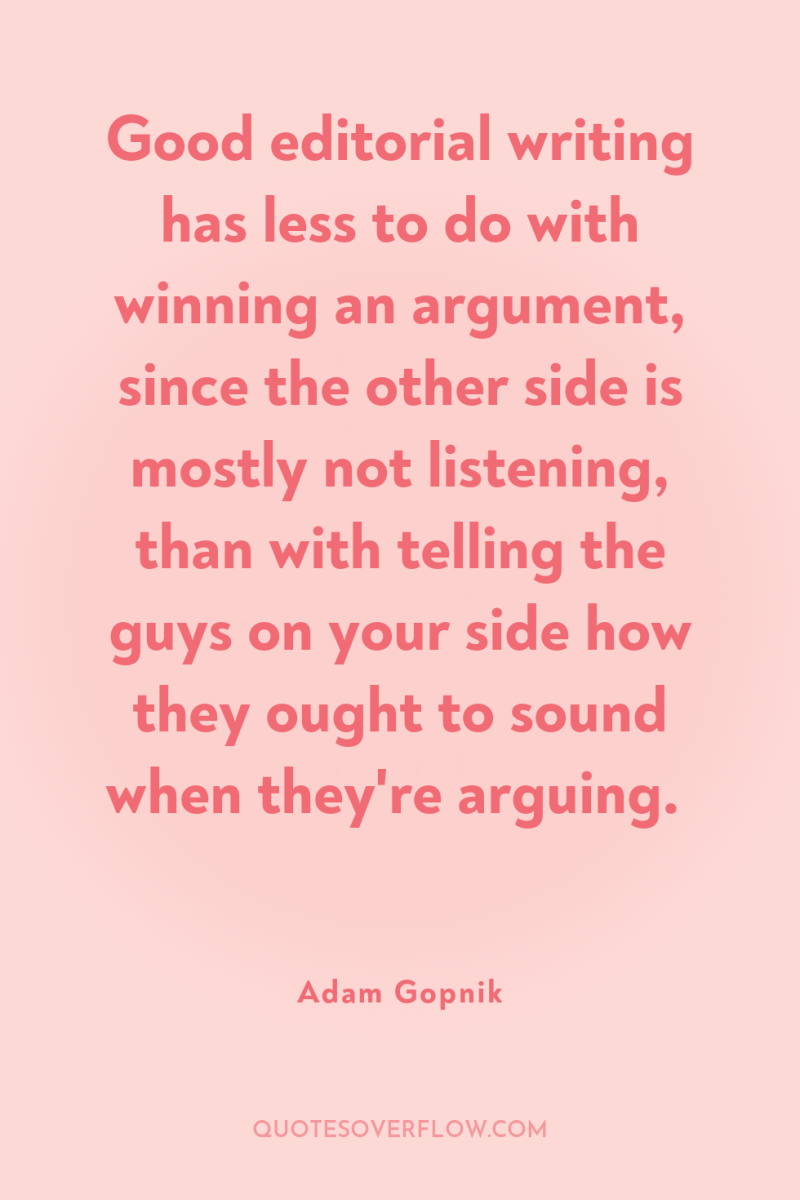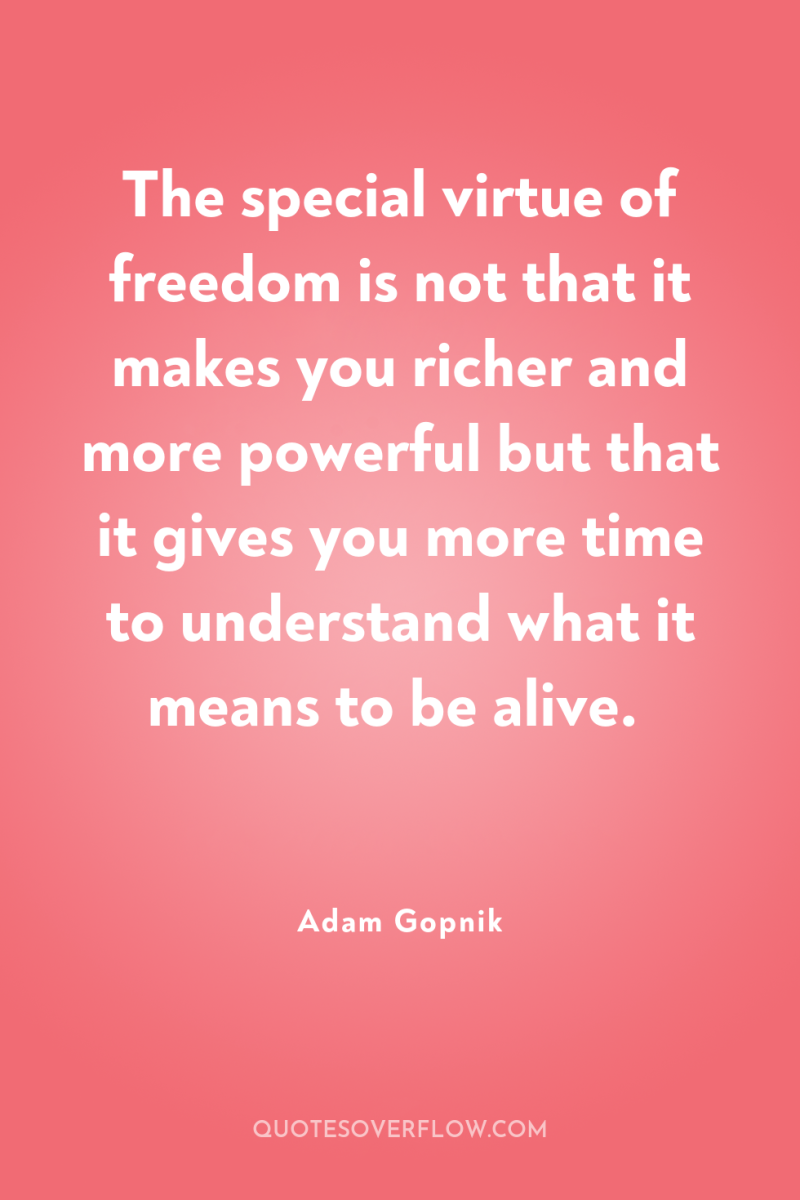1
This is surely the most significant of the elements that Tolkien brought to fantasy.... his arranged marriage between the Elder Edda and "The Wind in the Willows"--big Icelandic romance and small-scale, cozy English children's book. The story told by "The Lord of the Rings" is essentially what would happen if Mole and Ratty got drafted into the Nibelungenlied.Adam Gopnik

2
Good editorial writing has less to do with winning an argument, since the other side is mostly not listening, than with telling the guys on your side how they ought to sound when they're arguing.Adam Gopnik

3
The special virtue of freedom is not that it makes you richer and more powerful but that it gives you more time to understand what it means to be alive.Adam Gopnik
4
Of all the unexpected things in contemporary literature, this is among the oddest: that kids have an inordinate appetite for very long, very tricky, very strange books about places that don’t exist.Adam Gopnik
5
[T]he relentless note of incipient hysteria, the invitation to panic, the ungrounded scenarios--the overwhelming and underlying desire for something truly terrible to happen so that you could have something really hot to talk about--was still startling. We call disasters unimaginable, but all we do is imagine such things. That, you could conclude mordantly, is the real soundtrack of our time: the amplification of the self-evident toward the creation of paralyzing, preëmptive paranoia.Adam Gopnik
6
Yet human intelligence has another force, too: the sense of urgency that gives human smarts their drive. Perhaps our intelligence is not just ended by our mortality; to a great degree, it is our mortality.Adam Gopnik
7
Whatever our official pieties, deep down we all believe in lives. The sternest formalists are the loudest gossips, and if you ask a cultural-studies maven who believes in nothing but collective forces and class determinisms how she came to believe in this doctrine, she will begin to tell you, eagerly, the story of her life.Adam Gopnik
8
Big writers become a kind of shared climate.Adam Gopnik
9
Wit and puns aren't just decor in the mind; they're essential signs that the mind knows it's on, recognizes its own software, can spot the bugs in its own program.Adam Gopnik
10
What drives innovation is abundance and ease, not the pressure of scarcity.Adam Gopnik
11
There is, I believe now, a force in stories, words in motion, that either drives them forward past things into feelings or doesn't. Sometimes the words fly over the fence and all the way out to the feelings.Adam Gopnik
12
It is the vice of the journalist, I once wrote, to think that history can always be reduced to experience, and of the scholar to think that experience can always be reduced to history. History and experience are far more frequently out of sync, or running on parallel tracks.Adam Gopnik
13
We breathe in our first language, and swim in our second.Adam Gopnik
14
The French believe that all errors are distant, someone else's fault. Americans believe that there is no distance, no difference, and therefore that there are no errors, that any troubles are simple misunderstandings, consequent on your not yet having spoken English loudly enough.Adam Gopnik
15
The light obtained by setting straw men on fire is not what we mean by illumination.Adam Gopnik
16
[A]s military history reveals, a bad plan is often better than no plan, especially if the people on the other side think it’s a good plan.Adam Gopnik
17
Oliver, success is usually a feeling of mere relief, where failure is pain. Happiness, you see, lies in neither, but in sticking to a daily ritual and becoming absorbed in something useful. When the war is over, even the greatest warriors do not exult. They go back to their garden or kitchen or library -- or school -- and resume life.(as said by Mrs. Pearson)Adam Gopnik
18
All the media of modern consciousness–from the printing press to radio and the movies–were used just as readily by authoritarian reactionaries, and then by modern totalitarians, to reduce liberty and enforce conformity as they ever were by libertarians to expand it.Adam Gopnik
19
Ever since, New York has existed for me simultaneously as a map to be learned and a place to aspire too--a city of things and a city of signs, the place I actually am and the place I would like to be even when I am here. As a kid, I grasped that the skyline was a sign that could be, so to speak, relocated to New Jersey--a kind of abstract, receding Vision whose meaning would always be "out of reach, " not a concrete thing signifying "here you are." Even when we are established here, New York still seems a place we aspire to. Its life is one thing--streets and hot dogs and brusqueness--and its symbols, the lights across the way, the beckoning skyline, are another. We go on being inspired even when we're most exasperated. .Adam Gopnik
20
I remember looking out the window of the little maid's room where we had been installed, seeing the lights of the Palisades across the way, and thinking, There! There it is! There's New York, this wonderful city, I'll go live there someday. Even being in New York, the actual place, I found the idea of New York so wonderful that I could only imagine it as some other place, greater than any place that would let me sleep in it--a distant constellation of lights I had not yet been allowed to visit. I had arrived in Oz only to think, Well, you don't LIVE in Oz, do you? .Adam Gopnik
21
Going to a restaurant is one of my keenest pleasures. Meeting someplace with old and new friends, ordering wine, eating food, surrounded by strangers, I think is the core of what it means to live a civilised life.Adam Gopnik
22
The World Series is played in my doubtless too-nostalgic imagination in some kind of autumn afternoon light, and seeing it exclusively in the bitter chill of midnight breaks the spell of even the best of games.Adam Gopnik